In the last post, I talked about how the COVID-19 pandemic affected me personally -- which [thankfully] was not much. This time, I want to present some of my thoughts and opinions on the response to the pandemic from a policy and societal perspective, as well as what I perceive to be the lessons that we (as a society) should have learned.
Some of the most essential workers in our economy are the ones who are paid the least. Health care workers, delivery persons, postal workers, grocery clerks, warehouse workers, restaurant workers, and so forth were the people who had to keep going to work because our economy and lifestyles would grind to a complete halt without them. The median wages among employed individuals in the United States is around $49k per year. Yet according to Salary.com, the average salary for a professional truck driver is only around $42k. Contract or gig drivers (such as Amazon couriers) make far, far less.
Restaurant and grocery store workers also make far less than delivery drivers, often earning minimum wage (or less than minimum wage if you also make tips). Those who maybe kept their jobs, but were reliant on tips were especially hurt during the lockdowns, due to a lack of business and in-person contact.
Low-paid delivery persons and fast food workers were essential,
and had to keep working while the rest of us stayed home and safe.
And then there's the healthcare workers, who were literally putting their lives on the line every day, helping to take care of sick people and possibly exposing themselves to infection on a daily basis. Registered nurses (usually employed in hospitals) make decent pay, but the majority of support staff in private clinics are not necessarily registered nurses. This includes receptionists, phlebotomist, clerical staff, and other assistants. As of 2018, medical support staff earned an average of less than $40k per year!
Remember, these are the people who, during a pandemic, were considered "essential" workers who had to keep working (while everyone else stayed home) in order to keep a bare minimum economy running, and to allow the rest of us to continue to go about our daily lives. When shit hit the fan, we didn't look to lawyers, or corporate CEOs, or hedge fund managers, or brokers, or realtors, or movie stars, or athletes. Aside from doctors, we didn't need any of the traditionally highest-paid classes of workers. We needed truck drivers, postal workers, warehouse workers, grocery clerks, and food service workers, and of course medical staff. So I hope you remember this next time you hear someone say that these workers deserve higher pay, or that minimum wage should be increased. [More]
34e3e0bb-c9fb-4f6f-bba1-e6b8fae740b2|0|.0
Tags:COVID-19, coronoavirus, flu, influenza, pandemic, work, work from home, social distance, healthcare, insurance, social safety net, universal basic income, essential worker, education, tele-education, domestic abuse, Child Protective Services, pollution, carbon dioxice, climate change, stock market, corporate culture, racism, Civil War, Confederate Battle Flag
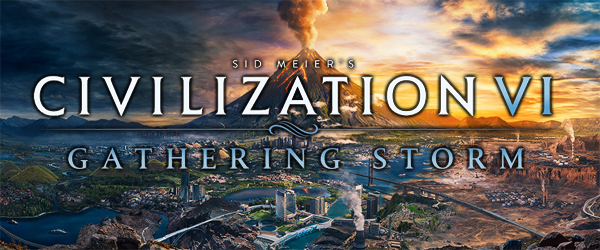
It's refreshing to see a video game (of all things) take seriously the second greatest existential threat to civilization (after nuclear weapon stockpiles), while governments (particularly here in the United States) fail to even acknowledge that it's real. I was honestly a little bit surprised to see anthropogenic climate change be the focus of an entire expansion to Firaxis' Sid Meier's Civilization VI. Firaxis has been playing very "politically correct" with the game in its past two iterations. Civ IV, if you remember, included slavery as a mechanic that allowed players to kill population in exchange for a production boost, and it included leaders like Joseph Stalin and Mao Zadong. Civilization III allowed collateral damage from city sieges that would kill population, destroy infrastructure, and potentially reduce wonders of the world to mere ruins. Civilization II allowed democratic congresses to overrule the choices of the player. And Civilization: Colonization actually required you to draft citizens from your cities into soldiers to fight wars.
Politically sensitive concepts like slavery, and characters like Joseph Stalin, have been in Civ games before,
but Civ V and VI have played things very safe and controversy-free with most of their content.
Civilization V and VI have dialed back from such concepts and leaders, as well as other "politically sensitive" topics in favor of diversity, inclusiveness, and a more rose-tinted vision of human history that tries to pretend that things like slavery, colonialism, opium wars, and the Holocaust didn't happen. I get it. They're going for a more optimistic vision of humanity that celebrates our achievements while overlooking the incalculable amount of [often unnecessary] suffering that came at the expense of many of those achievements.
So to see Anthropogenic Global Warming not only be included -- but to be the headline feature -- is surprising. I mean, I don't think it's a politically or culturally sensitive topic, nor should it be to anyone else if we lived in a rational world. It's the reality that we live in -- plain and simple. Nevertheless, it's a brave and important gesture from 2k and Firaxis. Anthropogenic climate change is certainly the second greatest threat to human civilization after our frightful stockpile of nuclear weapons -- or maybe an asteroid impact, but that is exceedingly unlikely to happen. It's an issue that needs to be a part of the cultural conversation, and it is perhaps the biggest price that we (as a civilization) are going to pay for the hubris of our unsustainable growth. It's a problem that every nation in the world needs to face, and solving that problem should be part of any game that attempts to simulate or systematize modern politics.
Anthropogenic climate change is one of the most serious problems threatening real-life civilization.
That is why I'm rather disappointed that the actual implementation of global warming in Civilization VI: Gathering Storm is a bit lackluster and un-apocalyptic.
The greatest existential threat to civilization is civilization
Climate change in Civilization VI: Gathering Storm just doesn't seem to be quite as devastating [globally] as it is in real life. Basically, raising the global temperature will have three effects.
- Increases the frequency of weather-related disasters,
- Melts polar ice caps,
- Floods certain coastal tiles.
Many disasters are trivially managed by leaving a builder or two (with 1 charge) to repair pillaged tiles.
The melting of the polar ice is actually a benefit, as it provides easier routes for naval units if canals aren't available or useable. The other two will cause problems for every player, but I've found them fairly easy to manage (at least on the Emperor difficulty that I usually play on). Disasters will typically pillage tile improvements and districts, but a severe disaster may also outright remove improvements, and may even kill points of population.
... [More]
4b253bea-180f-4b51-bee0-8ae99652603e|0|.0
Tags:Sid Meier's Civilization, Civilization VI, Civilization VI: Gathering Storm, weather, disaster, pollution, carbon dioxide, greenhouse gas, fossil fuel, climate change, global warming, flood, volcano, world congress, diplomatic favor, strategic resource, aqueduct, encampment, skirmisher, courser, cuirassier, pikeman
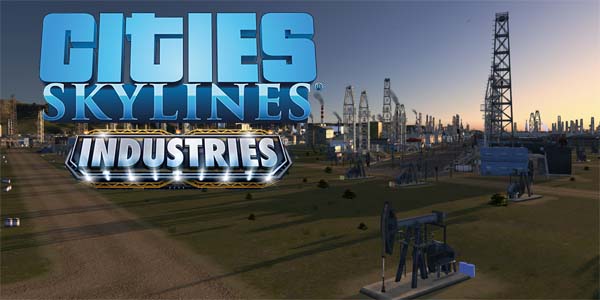
Wow, Colossal Order is really popping out these Cities: Skylines expansions in rapid succession! I feel like this is the third or fourth expansion in the last year alone! ... Hold on, let me check ...
| Expansion title | Original release |
 | After Dark | 24 September 2015 |
 | Snowfall | 18 February 2016 |
 | Match Day* | 9 June 2016 |
 | Natural Disasters | 29 November 2016 |
 | Mass Transit | 18 May 2017 |
 | Concerts* | 17 August 2017 |
 | Green Cities | 19 October 2017 |
 | Parklife | 24 May 2018 |
 | Industries | 23 October 2018 |
| * denotes a mini content pack, rather than full expansion. |
... So, yeah; third full expansion in the last 12 months (give or take a few days). Fourth expansion in the last 14 months if you want to count the Concerts content pack. Colossal Order seems to have been following a pattern of two full expansions and a mini content pack each year since the game released. I guess that's one way to keep your game relevant. It has certainly kept me coming back every few months.
Never as robust as I would like
The problem is that the limited development time means that the content that is provided in these expansions rarely ever feels as robust or comprehensive as it should -- at least, not to me. As such, I feel like I'm getting diminishing returns from each new expansion. The amount of content that is already in the game means that each new expansion feels like relatively smaller drop of content into an already-large bucket. Each expansion feels like it gives us less to do, and has that much of a smaller impact on the overall gameplay experience.
Adding to the problem of diminishing returns: every single expansion has had some glaring omission or weakness that bothered me, and none of the later expansions have bothered to go back in and address the weaknesses and limitations of the previous expansion(s). After Dark failed to include zoneable public beaches and didn't really make the day/night cycle feel as meaningful as it should. Snowfall failed to include season cycles to go along with After Dark's day/night cycle, and completely dropped the ball with regard to mechanics like ski resorts. Natural Disasters probably felt like the most "complete" and well-rounded expansion (not to mention the most novel one), but still suffers from its content being random, and it neglected to introduce any winter-specific disasters to go along with Snowfall.
Industries follows a long-standing trend with Skylines expansions neglecting seemingly-obvious features.
Mass Transit brought the long-overdue ferry transit option, but neglected to revise cargo harbors to make cargo ship routes more practical, and didn't have any water-based city services (like a coast guard, for example) that would allow a true island economy to function without a network of bridges for freight and emergency services. Green Cities was maybe the laziest expansion, and it focused on pollution-management, but didn't bother to actually make pollution any more relevant or challenging to begin with. Lastly, Parklife granted a lot of player expression, but failed to incorporate the legacy parks into the new modular park feature and doesn't allow the camera to zoom in close enough to get a good look at your pretty decorations.
This isn't to say that all these expansions are "bad". I've liked them all (except maybe for Snowfall and Green Cities), but none of them have really wow-ed me with their content (except maybe for Natural Disasters). And the modular nature of each expansion means that it has limited-to-no impact on the core game systems, and limited-to-no interaction with the previous expansions.
The latest expansion, Industries follows suit. It promises to re-invent the way that your cities' industry functions, but kind of does it in an almost half-assed way. Much like the expansion before it, Parklife, Industries doesn't really incorporate the old legacy industry zones into the new industry mechanics. The new "Industry Area" paintbrush is virtually the same mechanic as the Park Area paintbrush from the last expansion. It isn't a replacement for the original industrial district specialization, so if feels like it's pretty much duplicating that content rather than re-inventing it.
You paint an area as an "Industrial Park", just like the parks in Parklife.
... [More]
e7bfb680-e9c4-4e53-a202-52f87d32d445|3|3.7
Tags:Cities: Skylines, Cities: Skylines: Industries, Colossal Order, Paradox Interactive, city, city planner, city simulation, Cities: Skylines: Parklife, Cities: Skylines: After Dark, industry, pollution, natural resources, resources, production chain, district, farm, timber, lumber, ore, mining, oil, drilling, leisure, commerce
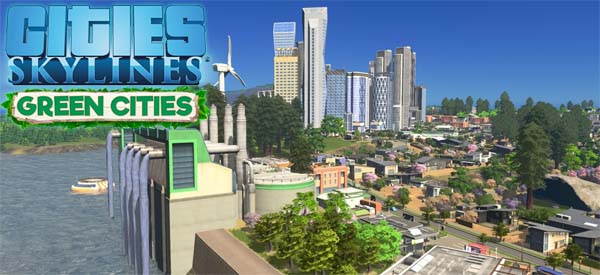
Didn't we just have another Cities Skylines expansion this spring or summer? Yep, we sure did. Mass Transit released only five months earlier (May 18th)! Heck, there was also another, tiny DLC pack released later in the summer as well. I didn't pick up the Concerts DLC. At $7 (more than half the price of a full DLC), I just didn't feel like it was a very good value if all it does is add the ability to make an outdoor concert venue. If the Concerts DLC had been a full-fledged expansion that focused on planning and managing city events, that might actually have been pretty cool. I actually would have been totally on board with a full expansion focused around building arenas, stadiums, convention centers, festival spaces, and so forth; then managing the traffic going into and out of them; and inviting concerts, sporting events, music festivals, trade shows, and maybe even political rallies or the Olympic games to your city. Unfortunately, the scope of Concerts is about the same as the Match Day DLC, which Colossal Order were kind enough to give away for free. Maybe I'll pick up Concerts if it goes on sale for $3 or $4.
Mass Transit, on the other hand, was a full expansion, and might very well have been the best expansion for Skylines to date. While the previous expansions were focused on adding additional flavor and customization to your city, Mass Transit actually took a stab at providing more utilitarian solutions to one of the most endemic problems that your burgeoning cities will inevitably face: traffic congestion. It was pretty successful at that mission.
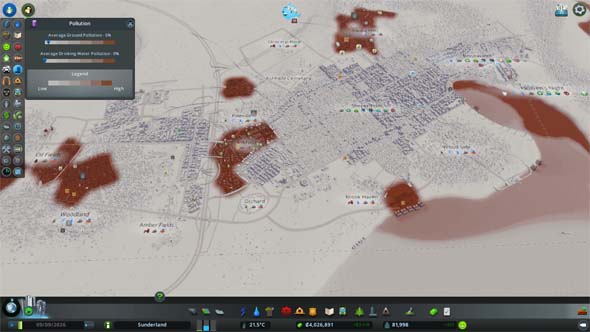
Green Cities aims to solve any pollution problems your larger cities may be suffering from.
Green Cities tries to follow suit. Except instead of helping to solve your traffic woes, it offers new tools for addressing the second most significant and intractable problem your cities will ever have: pollution.
I never really had a problem with pollution to begin with
I'll admit that I never really had much of a problem with pollution in my Cities: Skylines cities to begin with. Thus, I haven't really found Green Cities to be as useful as it seems to think it should be. I usually only had a few blocks of default industry in my cities. I usually focus on lumber and farming once they become unlocked, and then go strictly with offices once those are unlocked. And even then, I rarely play a single city long enough to get it up into the millions of population. Maybe at that point, pollution is a critical issue, but for me air pollution has rarely been a problem.
Smaller cities can see some benefit from the inclusion of things like the recycling center, which is available as early as the first milestone. It can apparently replace landfills in very small cities and seems to have less of a ground pollution footprint. I'm a bit annoyed that it doesn't seem to have any visual indicator of how full the building is. It would have been nice to have animations of the building filling up with junk and processing it, but whatever. The "Recycling" policy is still its own thing (and is unlocked a couple milestones later), and I'll admit I'm not sure how (or if) the recycling center building and the recycling policy interact with one another. I guess the recycling center actually acts as garbage storage and converts some trash into consumable goods, whereas the policy only reduces the amount of garbage that the city generates. There's also an "Plastic Recycling" policy that simply improves the efficiency of the recycling center.
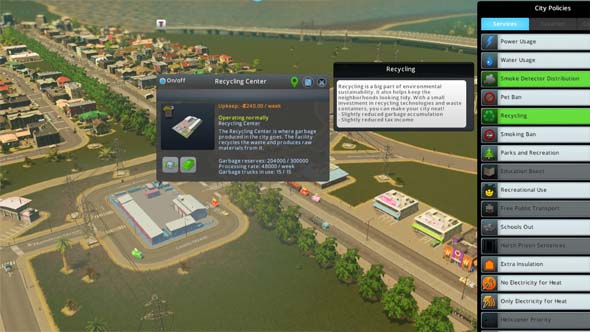
Recycling centers are available very early as a substitute for landfills.
Water pollution, on the other hand, is always a pretty big deal. Maps that have flowing water such as rivers are usually not a problem, but anytime I have to dump sewage into a lake (or even the ocean), it quickly becomes a cesspool. Up until now, there was virtually nothing that you could do about that... [More]
0bf42c7a-b9e9-41e4-8879-0f6259a2bb69|0|.0
Tags:Cities: Skylines, Cities: Skylines: Green Cities, Colossal Order Ltd., expansion, city simulation, pollution, health, energy, garbage, sewage, organic market, tech sector, solar power, garden
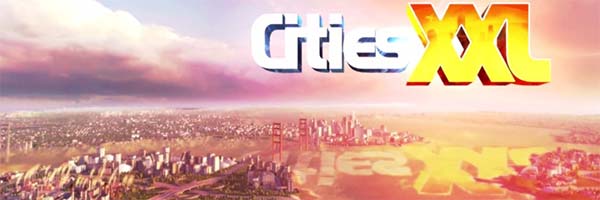
So right off the bat, Cities XXL is not substantially different from its predecessor (Cities XL). In my time with the game so far, I've only encountered two new features. Everything else, right down to the buildings available and the game interface, are unchanged. XXL hardly deserves to be called a sequel or sold as a new game. It's a content patch, and not even a very good one.
But on the upside, since I never got around to reviewing the original Cities XL, I can just roll them both into one review!
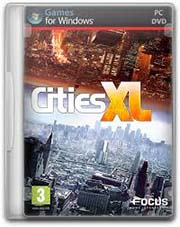
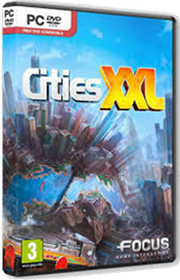
This review will cover both Cities XL, and Cities XXL because they're practically the same game.
When I first started playing Cities XL a few years ago, I was really impressed with it. I hadn't really played any modern city-builder games since SimCity 4, and so the jump to 3-D graphics, the ability to draw curved roads, and the sheer size of the maps was enough to win me over initially. But as I've played the game more, it's limitations and weaknesses have become much more apparent and hard to ignore. This is especially true in the game's interface and controls, which are very rough and full of nagging annoyances. When compared to the much smoother and organic controls of games like Tropico 5, the modern [disastrous] SimCity reboot, and even older games like Caesar IV, Cities XL really starts to look bad.
The biggest deterrent to enjoying Cities XL is its UI and controls. There's nothing that really single-handedly breaks the game, but there's a cacaphony of small, nagging problems that gradually wear down your resolve to play the game. The first thing that you'll notice is the ugly and disorganized interface. There are buttons and widgets floating all over the screen: build icons, overlay toggles, camera control widgets, zoning sub-controls, and so on. You can customize some of the UI elements by dragging them to different places on the screen, but there is no arrangement that really feels comfortable.
Charts, graphs, and table widgets are also ugly and difficult to read or understand, so I rarely use them. There's a lot of depth of information in these widgets, but they are just so poorly designed as to be nearly un-useable. And while some info-widgets show a great degree of granularity and precision, others are oddly abstracted. For example, shops and industrial buildings say that they require a "medium" number of workers of various classes, but they don't specify exactly how many employees they require. I assume that "low", "medium", and "high" correspond to the respective sizes of the residential zones, but I don't know for sure.
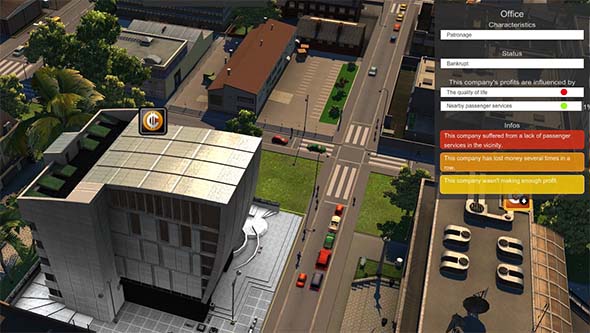
This office building had to close before I found out why it was unsatisfied.
Feedback in general is one of the game's weaknesses. The "satisfaction" level of buildings are all shown as colored circles rather than actual numbers. Those colored circles that indicate the satisfaction level of a building can be highlighted to show the percentage of satisfaction, but it won't necessarily give any indicators as to what is influencing that percentage... [More]
9ebe21c1-f541-459e-9b3b-e5fb4516a4d7|1|2.0
Tags:CitiesXXL, CitiesXL, Focus Home Entertainment, city simulation, simulation, economy, employment, unemployment, trade, resources, roads, pollution, ecology, taxes
|

| 12 | | | | | | | 60 | | 11 | | | | | | | 55 | | 10 | | | | | | | 50 | | 09 | | | | | | | 45 | | 08 | | | | | | | 40 | | 07 | | | | | | | 35 | | 06 | | | | | | | 30 | | 05 | | | | | | | 25 | | 04 | | | | | | | 20 | | 03 | | | | | | | 15 | | 02 | | | | | | | 10 | | 01 | | | | | | | 05 |
|